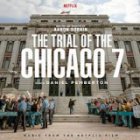
The Trial of the Chicago 7 Page #10
- Year:
- 2020
- 284 Views
JUDGE HOFFMAN:
Bailiff, charge Mr. Kunstler with
one count of Contempt.
ABBIE:
Welcome to our world, Bill.
KUNSTLER:
May I continue my argument so it
appears in the record?
68.
JUDGE HOFFMAN:
Continue.
KUNSTLER:
The jury will be in the custody of
deputy marshals. The marshals will
take care of all the wants and
needs of the jurors and we feel
that tends to make the jurors more
sympathetic toward-
JUDGE HOFFMAN:
I understand.
KUNSTLER:
The jurors are going to be taken
care of by law enforcement
officers. They won’t be allowed to
go home, they’ll have minimal
communication with-
As KUNSTLER’s been talking, TOM’s been looking across the
room at one of the MARSHALS. The MARSHAL is adjusting the
name tag on his uniform and as we push in a little on TOM, we
CUT TO:
71 EXT. HILTON HOTEL -NIGHT (TOM’S MEMORY) 71
A line of about fifty DEMONSTRATORS, including TOM and ABBIE
have their backs up against the dark-tinted picture window of
the Haymarket Tavern that’s part of the hotel and convention
center. Facing them down are a line of RIOT POLICE with their
clubs drawn. TOM sees something that immediately gets his
heart racing even faster-
--a RIOT POLICEMAN takes off his name tag and then his badge
and puts them in a pocket. Then another does the same and
then another and we
CUT BACK TO:
72 INT. COURTROOM -DAY 72
DELUCA’s on the stand.
DELUCA:
Frank DeLuca.
SCHULTZ:
And what is your occupation?
69.
DELUCA:
I’m a detective with the Police
Department, City of Chicago.
SCHULTZ:
Calling your attention to August of
1968 during the convention, were
you given any specific assignment?
DELUCA:
I was to keep Rennie Davis under
surveillance with my partner,
Detective Bell.
SCHULTZ:
And while surveilling Rennie Davis
on Sunday evening, August 25th, the
night before the convention began,
did you observe Tom Hayden
committing a crime?
DELUCA:
Yes. Mr. Hayden was letting the air
out of the tire of a police
vehicle.
CUT TO:
It’s a sweltering hot night as we get introduced to the park
and its occupants for the first time. Thousands of people
that can only be made out in silhouette with flickers of
lanterns, flashlights and fires. We can HEAR a pick-up band
singing Simon and Garfunkel’s “America” and the song will
continue throughout this whole sequence.
ANGLE--We see the pick-up band sitting around the stage
singing.
ANGLE--Tents being erected in a sea of tents that are already
erected.
ANGLE--A group making protest signs.
ANGLE--A fire burning in a garbage can. A sign reads “Burn
Your Draft Cards” as young men come up, rip up their draft
cards and throw them in the fire.
ANGLE--Another fire burning in another garbage can. A sign
reads, “Free Yourself from Patriarchy--Burn Your Bras”, with
women walking by and dropping their bars in the fire.
70.
ANGLE--A police vehicle is driving slowly and repeating on a
loudspeaker-
POLICE OFFICER (V.O.)
The park closes at 11pm by order of
the Chicago P.D. You must be out of
the park by 11pm. Violators will be
prosecuted for trespassing. The
park closes at-
ANGLE--ABBIE’s talking to a large group of protestors.
ABBIE:
It’s a strategy of throwin’ banana
peels all over Chicago and then let
the machine stumble. And when it
stumbles, it gets into a policy of
overkill and starts to devour
itself. We’ll convince ‘em. They’ll
be convinced. Of what? That we’re
crazy enough to do anything.
ANGLE--JERRY’s talking to a group of protestors.
JERRY:
confrontational tactical knowledge
to be understood. Confrontational
tactics make us safer. Why? Because
that’s fighting fire with-
PROTESTORS:
(shouting back)
FIRE!
JERRY begins his Molotov cocktail demonstration as we PULL
BACK to find TOM and RENNIE who are walking past Jerry’s TED
Talk.
TOM:
(to no one)
You don’t fight fire with fire, you
fight it with water, ya jackass.
RENNIE:
It’s a metaphor.
TOM:
Abbie and his f***in’ banana peels.
RENNIE:
Also a metaphor.
71.
TOM:
Between the cops, the state police
and the Guard, Daley’s got 15,000
soldiers on the street whose guns
are loaded with bullets that are
literal.
RENNIE:
I could make the argument that the
bullets were also-
TOM:
Yeah, so could I, but don’t. The
atmosphere’s starting to get
dangerous and someone’s gonna throw
a rock. I want to get the word out
that we’re protesting the war and
not the cops.
RENNIE sees something up ahead-
RENNIE:
Dammit.
TOM:
What?
RENNIE:
I think those are my guys, I think
that’s their car.
ANGLE--A few unmarked sedans are parked alongside some police
and park vehicles in an otherwise dark and deserted area.
TOM and RENNIE walk toward a particular sedan.
RENNIE (CONT'D)
Yeah, that’s them. They’re back.
They were following me all day.
Listen, here’s the thing I haven’t
told you about Sara Beth. She isn’t
into this at all.
TOM:
Isn’t into what?
RENNIE:
When I’m with her and her family, I
try to...de-emphasize the...radical
revolutionary part of my-
TOM:
Got it.
72.
RENNIE:
She and her parents are letting me
stay with them and if I show up
tailed by two undercover police
officers-
TOM:
That’d be hard to explain.
RENNIE:
This isn’t her world. And it’s
definitely not her parents’ world.
If I bring my world into their
driveway-
TOM:
Yeah.
RENNIE:
She’ll break up with me.
TOM:
You could be in a healthier
relationship.
RENNIE:
I know, but until then, this is the
one I’ve got.
TOM:
(pause)
That’s their car?
RENNIE:
Yeah.
TOM:
Where are they?
RENNIE:
Looking for me.
TOM thinks a minute...
TOM:
Alright. Go back into the crowd and
let ‘em find you. Then leave the
park by the east exit. They’ll need
their car to follow you.
RENNIE:
What are you gonna do?
73.
TOM:
It’s not gonna remind anyone of
Ghandi but a little civil
disobedience. Go.
RENNIE:
You’re not gonna cut their breaks
or anything, right?
TOM:
What? No, I’m gonna let the air out
of one of the tires. Now go.
RENNIE:
I really appreciate it. I don’t
want to be a phony with SaraBeth
but sometimes it takes a little-
TOM:
RENNIE:
Yeah.
RENNIE heads off and TOM takes out his keys as we
CUT BACK TO:
74 INT. COURTROOM -DAY 74
The pick-up band singing “America” continues over-
DELUCA:
Detective Bell and I spotted Rennie
Davis walking in the crowd and
observed him on foot for a few
minutes. Then we returned to the
unit.
SCHULTZ:
Your car.
DELUCA:
Yes.
SCHULTZ:
And what did you find?
CUT TO:
74.
TOM is on his knees letting the air out of a tire of the
unmarked car with his key when the shadow of a man envelopes
him and he stops.
Translation
Translate and read this script in other languages:
Select another language:
- - Select -
- 简体中文 (Chinese - Simplified)
- 繁體中文 (Chinese - Traditional)
- Español (Spanish)
- Esperanto (Esperanto)
- 日本語 (Japanese)
- Português (Portuguese)
- Deutsch (German)
- العربية (Arabic)
- Français (French)
- Русский (Russian)
- ಕನ್ನಡ (Kannada)
- 한국어 (Korean)
- עברית (Hebrew)
- Gaeilge (Irish)
- Українська (Ukrainian)
- اردو (Urdu)
- Magyar (Hungarian)
- मानक हिन्दी (Hindi)
- Indonesia (Indonesian)
- Italiano (Italian)
- தமிழ் (Tamil)
- Türkçe (Turkish)
- తెలుగు (Telugu)
- ภาษาไทย (Thai)
- Tiếng Việt (Vietnamese)
- Čeština (Czech)
- Polski (Polish)
- Bahasa Indonesia (Indonesian)
- Românește (Romanian)
- Nederlands (Dutch)
- Ελληνικά (Greek)
- Latinum (Latin)
- Svenska (Swedish)
- Dansk (Danish)
- Suomi (Finnish)
- فارسی (Persian)
- ייִדיש (Yiddish)
- հայերեն (Armenian)
- Norsk (Norwegian)
- English (English)
Citation
Use the citation below to add this screenplay to your bibliography:
Style:MLAChicagoAPA
"The Trial of the Chicago 7" Scripts.com. STANDS4 LLC, 2025. Web. 11 Mar. 2025. <https://www.scripts.com/script/the_trial_of_the_chicago_7_25401>.







Discuss this script with the community:
Report Comment
We're doing our best to make sure our content is useful, accurate and safe.
If by any chance you spot an inappropriate comment while navigating through our website please use this form to let us know, and we'll take care of it shortly.
Attachment
You need to be logged in to favorite.
Log In